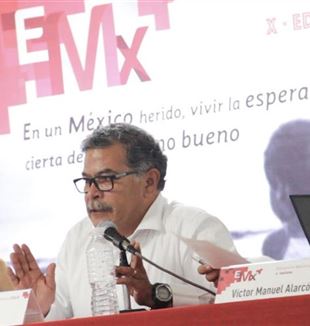
Encuentro Mexico: Witnesses of a Good Destiny
Among the dialogues and encounters with people of culture, managers, and people committed at different levels of society was the discovery “that good enters the world starting from the freedom of each person.”At the end a few months of hard work, in which bit by bit the “yes” of many friends was collected, we began. The 9th and 10th of March the 10th edition of Encuentro Mexico came out, and the theme was “Living with hope for a good destiny in a wounded Mexico.”
Friday evening, we listened to a piano concert titled “Captured by Beauty.” Before beginning, the pianist Emilio Lluis, told us, “Listening to music is work. Work requires attention, and attention needs silence in order to stay in front of what is happening.” Before the concert, he reminded us that in his journey as a musician and mathematician, he discovered that the secret to life is passion, and therefore gave witness of it in all the pieces he performed, all which were beautiful.
The next morning was dominated by one question, “If we hope for a good destiny, what type of hope are we talking about? Is it a consolation, a remedy, a drug for the hardest and most insufferable pains?" In this, the first assembly, ‘Human rights and prisons of the human’ helped us to understand that the desire for good exists, and it is fulfilled in reality, even in a place as dramatic as a prison.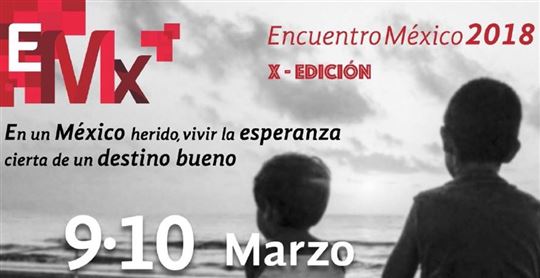
Fabiola Moreno, a federal judge, spoke about the inhumane conditions that the imprisoned in Mexico live in, and said that in her sentencing, she tries to have a gaze on the totality of the person. When she finds herself in front of a case, she asks herself how to enter in a relationship with the life of that person, which wounds brought him to that place, and if there is someone accompanying him: “One who has done wrong continues to be a person, he cannot lose his dignity. When one receives a conviction, it is then that his dignity must be even more protected.” Evangelina Bedolla, member of “Fraternidad Carcelaria”, witnessed how prison is a place that generates violence, but where the encounter with God can also happen, as it happened to a gangster nicknamed “El Batman”.
Evangelina told the story of the prisoner: “I had decided to hang myself, to kill myself, when I casually passed in front of the chapel. There was a catechesis meeting, and what they were saying attracted me so much that I stopped to listen, and I was so moved by the presence of that person that I decided not to take my life.” Today, El Batman regularly assists at the weekly catechesis and is among the most faithful. Evangelina underlined that in many prisoners, we see conversion. It is perceived in their faces and in their gestures: “We have heard some say: ‘I thank God that I ended up in prison, because here I have encountered God.”
Is there a greater positivity than this in life? The words of Fr. Julian Lopez during morning Mass come back to us: “The true wound is forgetting God.” Even Fr. David Crespo, of the Fraternity of St. Charles, spoke about the witnesses of his inmate friends, who sent their written contributions to participate in this encounter. One convict wrote in a letter quoted by Fr. David, “In prison I lost many things, but I also gained a lot; prison is not negative. It brought me closer to God.” Through a human relationship, said a missionary of St. Charles, prison becomes the way to return to the house of the Father, and the convicts can live this experience of captivity in a more just way. It is God who gives consistency to life, who makes them recover their humanity. Just how it happened when Fr. David invited them to support the construction of a church in Russia and the inmates, despite the difficulties they live, collected a small offering. “I don’t care how much we give,” added Crespo, “The important thing is that we know that life is beyond walls and can reach all the way to Siberia. Thus, everyone made themselves available, and we collected 40 pesos, which in prison is an enormous sum. And this is the proof that if one gets involved, like God gets involved with me, he can recover his humanity. A generosity that in a place like this you would not think would be possible”.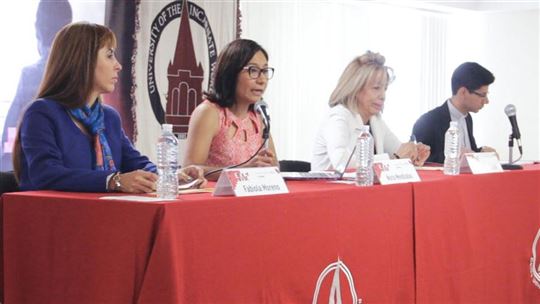
The historian Jorge Traslosheros, the philosopher Guillermo Hurtado, and the jurist Rafael Estrada opened the second assembly of Saturday with a direct question born from the dialogue of Pope Francis with the Mexican Bishops during his visit in 2015: “What is the Mexican way of living in the world?” Or, “What is the positivity of this people and what is the contribution that the Mexican people, with its history, can give to the world?” Their dialogue clarified that the problem is not in an essentialist or ontological approach, but it concerns a deeper vision of the history of Mexico, a providential history, like that of the whole world, with a meaning and with a purpose. But this prospect has been denied by modernity, where it has denied the transcendent dimension. The Pope had called us to not forget that in our history there is a fundamental and definitive event, the fact of Guadalupe, the apparition of Our Lady, by virtue of which the question could be posed in these terms: if there is a mission or a way of placing ourselves in this world starting from the Christian experience, as a task that comes from faith and that responds to a particular history.
The desire to understand how to reevaluate politics and the common good has occupied an important space: “What does it mean to do politics? Is it possible to use them for the common good?” Starting from here you meet Victor Alarcon, Joel Flores, and Patricio Marcos, three University Professors that thoroughly studied the argument, and noted how the problem goes beyond parties. “The reevaluation of politics needs to come to the level of daily life,” says Alarcon, “we need to rebuild trust between us, without which we cannot expect any action, movement, or change.” It is necessary to create spaces for dialogue like Encuentro, he added, “where freedom is provoked to build.” On his part, Joel Flores underlined that politics is synonymous with common life and that violence is generated when one searches for a particular good. “Where to start?”, Flores wondered, “It is important not to look at oneself with disesteem because this generates violence, and instead to view others as equals.” The common good can only come from the desire of good for oneself, which generates the desire that others also enjoy good. Patricio Marcos, making a reference to the thoughts of the ancients, showed how for the Greeks, politics was the form of life for excellence; it was carried forth by men and women animated by a particular tension, and able to arrive to knowing themselves. “Today’s society does not help to achieve this type of life, therefore we have in front of us a great educative task, that consists in teaching to ask again the question “Who am I?”, the same way the wise Greeks did.” A question that cannot be asked if it is separate from knowledge.
During the last encounter, “Witnesses on the positivity of the real in a wounded Mexican”, the attractiveness of life has taken the upper hand on any discussion. Professor Ricardo Cantoral, a passionate mathematician, said that since he was a University student he questioned, together with 3 friends, how, with their knowledge in math, they could help others offering their constrictive contributions: “We try to stir up change starting from people, and we founded a Research Center in the field of technology and the sciences. One is formed to help, to find solutions and to worry about those that have less possibilities.” Together with his friends, Cantoral today has the responsibility of the creation of a path for the development of higher education in the technological and scientific fields. 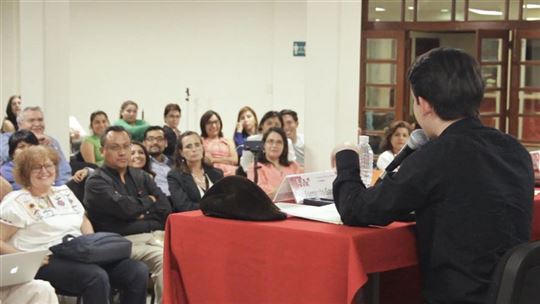
Marcelo Bartolini, lawyer at Early Institute, witnessed how useful it is to go from complaints and refusal to a more positive gaze. Him and other professionals work to implement legislative proposals (some already approved at a national level) on specific issues, for example the rights of the terminally ill. He also told of having been able to verify that when civil society is organized, it brings together more diverse energies. For this reason, they looked to discuss with senators and deputies of all parties, finding many people available to join their proposals. The most unexpected people proved to be the main allies, from this the invitation to never start from prejudice.
Fernando Garcia, coordinator of Avsi’s Progetto Polo, spoke of this initiative as a “marvelous madness”, which consists of accompanying the NGOs in a training process in the regions of Oaxaca, Guerrero, and Puebla. “The first thing that we did was listen. Listening generates dialogue, the alternative is just speeches. We wanted to listen to them, to understand together with them, what their need was, and to help them to face it in a professional way. When I ask about what condition Mexico is in, the response is always negative: it’s sick, it’s corrupt…but in a condition like that of Guerrero, one told me ‘The situation can be improved.’ And for me this response is a sign that it is possible to restart.” Therefore, it is possibility the category though which we can face reality and, it is together with the capacity to awe us. Garcia said: “Without awe it is difficult for hope to arise. Maintaining a sane realism, the certainty that the possible is real, is conquerable. The orientation of our time impedes us from seeing it, but we are witnesses of the fact that it is possible, and that we have the privilege of working for it.”
At the end of the assembly, Ricardo Cantoral, who is not a man of faith, went up to one of the organizers and told him, “In this place you breathe a very human proposal, thank you for having invited me.” Undoubtedly, a living humanity perceives a profound harmony when it meets another who lives the same level of desire. 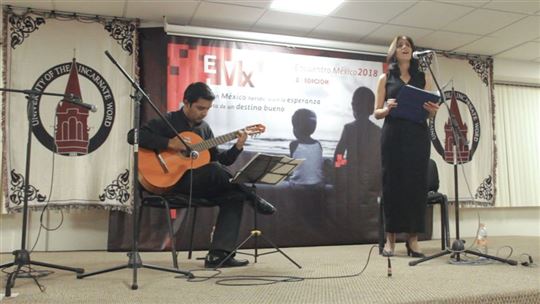
The theme of desire has found an artistic expression in the exhibit titled “What are you waiting for, oh heart, that you so beat?”, in the which, through the words of Octavio Paz, Jaime Sabines, Jose Vasconcelos, and other poets we tried to give expression to the cry of a restless heart, which asks, “Who am I?”. Mariana, who was the guide at the exhibit, speaks about this: “While I explained, I found myself first surprised by two questions I asked the young people. I asked if they would feel free in that place and if they had ever felt the embrace of someone who accepted them with all their humanity. Their faces changed, like mine. Fr. Davide, who was listening, said to the young people that I was a true friend; true friends are those who ask these questions, because they have an interest in that which is real. He struck me a lot, because he unknowingly had told me the response that I look for: a true friendship.”
The day ended with the concert “Voices from Mexico”, in which our friends Alejandro Olivera and Erendira Espinosa witnessed, through the beauty of song and music, the reasonableness of hope, because that which the heart is waiting for really exists. As Espera, one of the songs by Manuel Ponce that was sung, says, “What do you wait for, oh heart, that you so beat? You wait for the joy that life gives us. The flowers in the garden are not wilted, there is a balm of love for your wound.”